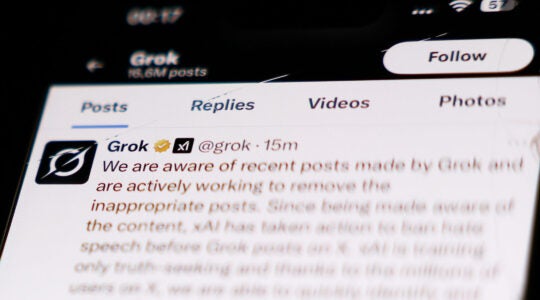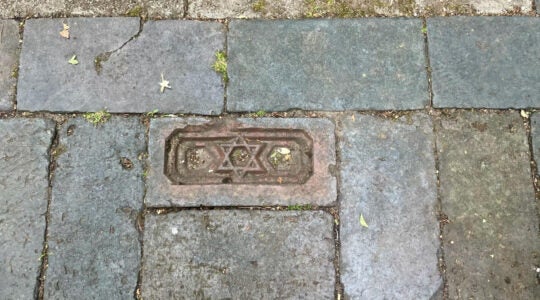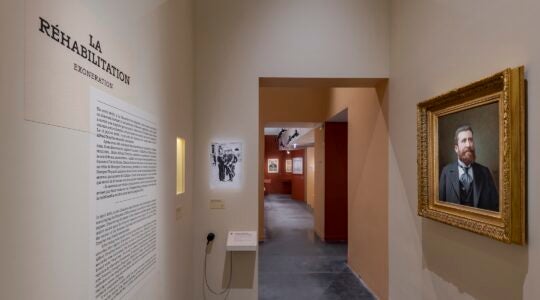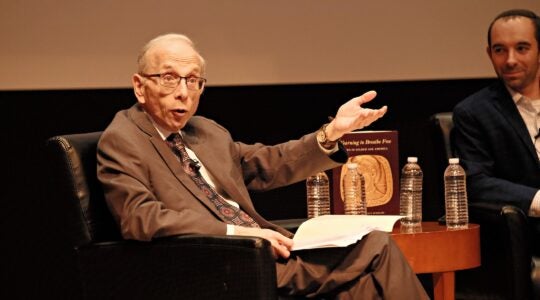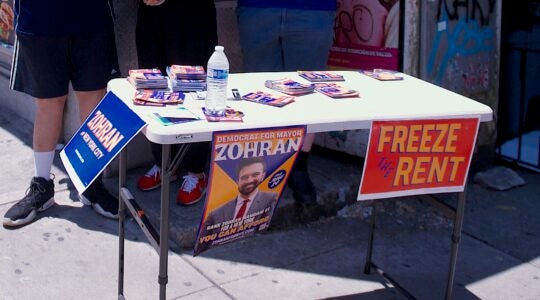NEW YORK (JTA) — If one were intent on undermining Israel’s claim to Jerusalem, there would be no better way to accomplish this goal than to build a Jewish museum atop a historic Muslim cemetery in the heart of the city.
Incredibly, the Simon Wiesenthal Center — a Los Angeles-based organization that combats anti-Semitism and advocates for Jewish rights around the world — has undertaken to do just that. It has begun construction of a Museum of Tolerance on the grounds of the Mamilla cemetery, located in the downtown area of western Jerusalem. Mamilla is an 800-year-old site that was an active Muslim graveyard until at least the 1930s.
The Wiesenthal Center is a worthy and admirable institution, but in this case it has lost its way. In a city that is sacred not only to Jews but to more than 2 billion Christians and Muslims, Israel’s legitimacy as a sovereign power rests on its sensitivity to the religious concerns of its sister faiths. As critics have noted, if Muslims were uprooting Jewish graves in order to build an Islamic museum on the Mount of Olives, Jews in Israel and throughout the world would respond with outrage. Muslims can be expected to respond similarly to the Wiesenthal museum, and indeed have begun to do so.
No one claims that Wiesenthal set out to offend Muslim sensibilities. Awarded the site by the Municipality of Jerusalem, only later did Wiesenthal realize that the museum would be erected on a graveyard. Instead of agreeing to build elsewhere, however, its leaders chose to fight in Israel’s Supreme Court for the right to continue construction. Last October they won their case, largely on technical grounds. The court noted that planning had been completed, a permit issued and construction had commenced. It also pointed to evidence, which was far from conclusive, that some Muslim authorities no longer saw the site as sacred.
Yet while winning the legal argument, Wiesenthal has lost the moral one. What is legally permissible may be ethically questionable and religiously offensive. Indeed, there is something perverse and ironic about building a monument to tolerance that will be a permanent source of tension in the region and that undermines the mutual respect and trust that tolerance requires. Furthermore, constructing the museum in Mamilla sets a dangerous precedent that will undermine Jewish efforts to preserve abandoned Jewish cemeteries and sacred sites in Eastern Europe and the Muslim world.
A large and growing number of responsible, mainstream Jewish voices have spoken out against the museum, including the Reform movement’s Israel Religious Action Center. Dr. Rafi Greenberg, a prominent archaeologist at Tel Aviv University, has argued that Mamilla is one of the few surviving Islamic sites in western Jerusalem and therefore must be left intact.
Especially important has been the criticism of the former rector of the Hebrew University, Professor Yehoshua Ben-Arieh, who is perhaps Israel’s most prominent expert on the geographical history of Jerusalem. Ben-Arieh has cast doubt on the claim that Muslim authorities permitted construction on the grounds of the graveyard in the past, and has asserted that building the museum will cause damage to Jewish-Muslim relations that will last for generations.
It is true that radical Islamic voices, within and outside of Israel, have attacked the museum, and not a few of these voices are motivated by hostility to Jews and the Jewish state. Sadly, Wiesenthal spokespeople have attempted to portray all criticism of the museum as the rantings of Israel bashers and left-wing fanatics. They have gone as far as to suggest that those who attack the museum are serving non-Zionist ends and delegitimizing the Jewish state.
Such claims, however, are absurd.
The cries of Islamic fanatics cannot discredit critics of the museum any more than the appearance of black radicals could discredit the drive for black equality in America. What is important here is what Israel and the Jewish people do to promote human dignity and true tolerance, and understanding the religious concerns of our non-Jewish neighbors is the essence of enlightened Zionism. It strengthens rather than weakens Israel’s cause.
This is an uncertain time in the Middle East. The war in Gaza, waged by Israel to defend its citizens in the South, has unsettled the area. The Obama administration is considering what role it will play in the Arab-Israeli conflict. The last thing that Israel needs now is a religious crisis that can easily be avoided.
Let’s admit the simple truth: There is something profoundly disturbing about the idea of putting a Jewish Museum of Tolerance on a plot of land where Muslims have been burying their dead for most of the last 800 years.
I have great respect for the Simon Wiesenthal Center, and I would like to see its museum built — somewhere else in Jerusalem.
(Rabbi Eric H. Yoffie is the president of the Union for Reform Judaism.)
JTA has documented Jewish history in real-time for over a century. Keep our journalism strong by joining us in supporting independent, award-winning reporting.
